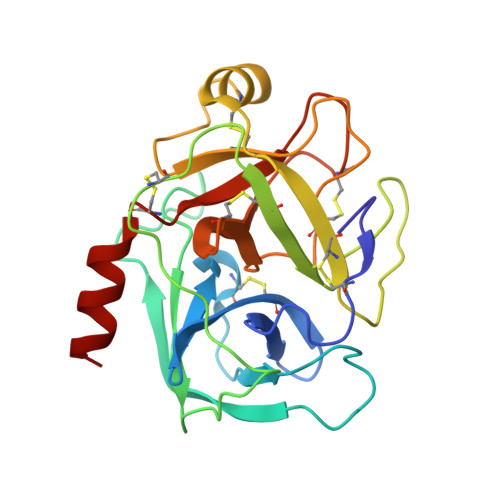Structural basis for selectivity of a small molecule, S1-binding, submicromolar inhibitor of urokinase-type plasminogen activator.
Katz, B.A., Mackman, R., Luong, C., Radika, K., Martelli, A., Sprengeler, P.A., Wang, J., Chan, H., Wong, L.(2000) Chem Biol 7: 299-312
- PubMed: 10779411
- DOI: https://doi.org/10.1016/s1074-5521(00)00104-6
- Primary Citation of Related Structures:
1C5L, 1C5M, 1C5N, 1C5O, 1C5P, 1C5Q, 1C5R, 1C5S, 1C5T, 1C5U, 1C5V, 1C5W, 1C5X, 1C5Y, 1C5Z - PubMed Abstract:
Urokinase-type plasminogen activator (uPA) is a protease associated with tumor metastasis and invasion. Inhibitors of uPA may have potential as drugs for prostate, breast and other cancers. Therapeutically useful inhibitors must be selective for uPA and not appreciably inhibit the related, and structurally and functionally similar enzyme, tissue-type plasminogen activator (tPA), involved in the vital blood-clotting cascade. We produced mutagenically deglycosylated low molecular weight uPA and determined the crystal structure of its complex with 4-iodobenzo[b]thiophene 2-carboxamidine (K(i) = 0.21 +/- 0.02 microM). To probe the structural determinants of the affinity and selectivity of this inhibitor for uPA we also determined the structures of its trypsin and thrombin complexes, of apo-trypsin, apo-thrombin and apo-factor Xa, and of uPA, trypsin and thrombin bound by compounds that are less effective uPA inhibitors, benzo[b]thiophene-2-carboxamidine, thieno[2,3-b]-pyridine-2-carboxamidine and benzamidine. The K(i) values of each inhibitor toward uPA, tPA, trypsin, tryptase, thrombin and factor Xa were determined and compared. One selectivity determinant of the benzo[b]thiophene-2-carboxamidines for uPA involves a hydrogen bond at the S1 site to Ogamma(Ser190) that is absent in the Ala190 proteases, tPA, thrombin and factor Xa. Other subtle differences in the architecture of the S1 site also influence inhibitor affinity and enzyme-bound structure. Subtle structural differences in the S1 site of uPA compared with that of related proteases, which result in part from the presence of a serine residue at position 190, account for the selectivity of small thiophene-2-carboxamidines for uPA, and afford a framework for structure-based design of small, potent, selective uPA inhibitors.
Organizational Affiliation:
Axys Pharmaceutical Corporation, South San Francisco, CA 94080, USA. brad_katz@axyspharm.com


















